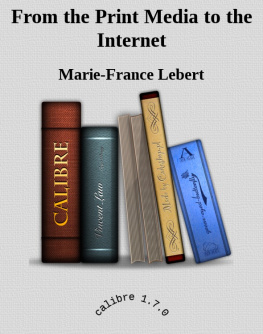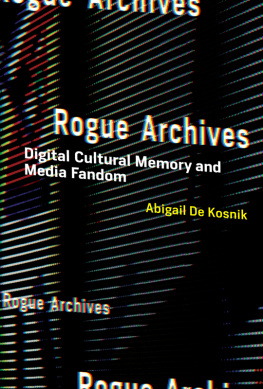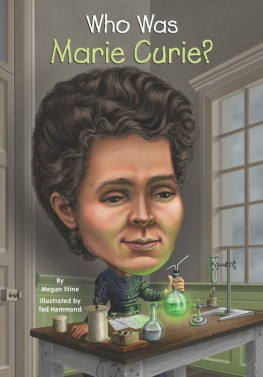Marie-France Lebert - From the Print Media to the Internet
Here you can read online Marie-France Lebert - From the Print Media to the Internet full text of the book (entire story) in english for free. Download pdf and epub, get meaning, cover and reviews about this ebook. year: 1999, publisher: Zéro Heure, genre: Politics. Description of the work, (preface) as well as reviews are available. Best literature library LitArk.com created for fans of good reading and offers a wide selection of genres:
Romance novel
Science fiction
Adventure
Detective
Science
History
Home and family
Prose
Art
Politics
Computer
Non-fiction
Religion
Business
Children
Humor
Choose a favorite category and find really read worthwhile books. Enjoy immersion in the world of imagination, feel the emotions of the characters or learn something new for yourself, make an fascinating discovery.
- Book:From the Print Media to the Internet
- Author:
- Publisher:Zéro Heure
- Genre:
- Year:1999
- Rating:5 / 5
- Favourites:Add to favourites
- Your mark:
- 100
- 1
- 2
- 3
- 4
- 5
From the Print Media to the Internet: summary, description and annotation
We offer to read an annotation, description, summary or preface (depends on what the author of the book "From the Print Media to the Internet" wrote himself). If you haven't found the necessary information about the book — write in the comments, we will try to find it.
From the Print Media to the Internet — read online for free the complete book (whole text) full work
Below is the text of the book, divided by pages. System saving the place of the last page read, allows you to conveniently read the book "From the Print Media to the Internet" online for free, without having to search again every time where you left off. Put a bookmark, and you can go to the page where you finished reading at any time.
Font size:
Interval:
Bookmark:
Project Gutenberg's From the Print Media to the Internet, by Marie Lebert
This eBook is for the use of anyone anywhere at no cost and withalmost no restrictions whatsoever. You may copy it, give it away orre-use it under the terms of the Project Gutenberg License includedwith this eBook or online at www.gutenberg.org
** This is a COPYRIGHTED Project Gutenberg eBook, Details Below **** Please follow the copyright guidelines in this file. **
Title: From the Print Media to the Internet
Author: Marie Lebert
Release Date: October 26, 2008 [EBook #27030]
Language: English
*** START OF THIS PROJECT GUTENBERG EBOOK FROM PRINT MEDIA TO INTERNET ***
Produced by Al Haines
Editions 00h00, Paris, 1999 & NEF, University of Toronto, 2001
Copyright 1999 Marie Lebert
How does the world of the print media approach this new means of communicationthat is the Internet? How does the Internet take into account the various partsof the print media? A study written in March 1999 and based on many interviews.With many thanks to Laurie Chamberlain, who kindly edited this paper. The Frenchversion of this paper - De l'imprim Internet - is not a translation, but adifferent text. The original versions are available on the NEF, University ofToronto: http://www.etudes-francaises.net/entretiens/print.htm
1. Introduction
2. The Internet
3. On-Line Bookstores
4. Publishers on the Web
5. On-Line Press
6. Libraries on the Web
7. Digital Libraries
8. On-Line Catalogs
9. Perspectives
10. Index of Websites
11. Index of Names
The world of the print media is big: it includes everything related to books,periodicals and pictures. The world of the Internet is much bigger. It is thattremendous network which is leading to the upheaval of communications andworking methods we are hearing so much about.
Are these two worlds antagonistic or complementary? What is the influence of oneworld on the other, and vice versa? How does the world of the print media acceptthis tremendous means of communication which is the Internet? How does theInternet take into account this centuries-old tool which is the print media? Dothey work together? Do they compete? What is their common future? Will the worldof the Internet completely swallow up the world of the print media, or, to thecontrary, will the print media domesticate the Internet as an additional meansof communication?
We are not even aware yet of the many interconnections and transformations theInternet is going to bring if the Internet changes the world as much as writingor printing did in the past, as we are constantly being told it will.
What are the implications for all the professionals of the print media: authors,booksellers, journalists, librarians, printers, publishers, translators, etc.?How do they see the breaker which is beating down on them, and the storm thatthe Internet is bringing into their professional life? These are the questions Iwill try to answer in the following pages.
More and more publications have both an electronic version and a paper versionand, in some cases, both can be ordered on-line. Numerous texts are availableon-line in digital libraries. Many of these texts also have a paper version thecybernaut can buy if he prefers reading 500 pages lying on his sofa instead ofreading them on the screen of his computer. Some texts or magazines areavailable on-line only.
More and more newspapers and magazines have a website on which their readers canfind the full text or abstracts of the latest issue, archives giving access tothe previous issues, dossiers on various topics, etc. More and more librarycatalogs are available on-line. And most sites offer hyperlinks to otherwebsites or documents on related subjects. In short, the Internet has become anessential tool for getting information, having access to documents andbroadening our knowledge.
I will examine the interaction of the print media and the Internet in thefollowing areas: bookstores, publishers, press, libraries, digital libraries andcatalogs. I shall also include the contributions of the media professionals whoanswered my inquiry about: (1) the way they see the relationship between theprint media and the Internet; (2) what the use of the Internet has brought intheir professional life and/or the life of their company/organization; and (3)how they see their professional future or the future in general with theInternet. I express here my warmest thanks to all those who replied to myinquiry.
I will also comment on the future trends regarding intellectual property,digitization, multimedia convergence and the information society. A selection ofwebsites is also available. Some of the information included here is probablyalready obsolete. Never mind. The world of the Internet is fast-moving andevolves constantly - that is one of its many assets.
This study follows a Ph.D. I completed in 1998-99 at the University of theSorbonne (Ecole pratique des hautes tudes), Paris, France. Although the keyideas are the same, it is not the translation of the French study, which wasFrancophone-oriented. New websites and new contributions from people belongingto the English-speaking and the international community have been included here.
Originally, I worked as a librarian in Europe and in the Middle East, undercontract to set up libraries and/or computerize catalogs. More recently, I havebeen contributing to the preparation of publications as a writer, translator,editor or indexor. Since 1996 I have been working mainly for the InternationalLabour Office (ILO), Geneva, Switzerland. As I am fascinated by languages, Ialso wrote a study about Multilingualism on the Web.
[In this chapter:]
[2.1. The Internet and the Other Media / 2.2. The "Info-Rich" and the"Info-Poor" / 2.3. The Web: First English, then Multilingual]
2.1. The Internet and the Other Media
Since a few years ago, the Internet has become integrated into our daily life,and people have gotten connected at home, at work or in their university. At theend of 1997, the number of Internet users was estimated at 90 or 100 million,with one million new users every month. In the year 2000, the number of Internetusers will be over 300 million.
Does the Internet compete directly with television and reading? In Quebec, where30.7% of the population is connected, a poll taken in March 1998 for thecybermagazine Branchez-vous! showed that 28.8% of connected Quebeckers werewatching television less than before. Only 12.1% were reading less. As stated bythe French Canadian magazine Multimdium in its article of April 2, 1998, it was"rather encouraging for the Ministry of Culture and Communications which has thedouble task of furthering the development of information highways andreading!"
The Internet has become the medium of choice for many news consumers, in manycases matching and occasionally surpassing traditional forms of media, accordingto a survey conducted in February 1998 for MSNBC on the Internet by MarketFacts.
In an article of Internet Wire, February, 1998, Merrill Brown, editor-in-chiefof on-line MSNBC, wrote:
"The Internet news usage behavior pattern is shaping up similar to broadcasttelevision in terms of weekday use, and is used more than cable television,newspapers and magazines during that same period of time. Additionally, onSaturdays, the Internet is used more than broadcast television, radio ornewspapers, and on a weekly basis has nearly the same hours of use asnewspapers."
The corresponding number of hours per week are: 2.4 hours for magazines; 3.5hours for the Internet; 3.6 hours for newspapers; 4.5 hours for radio; 5 hoursfor cable TV; and 5.7 hours for broadcast TV.
Next pageFont size:
Interval:
Bookmark:
Similar books «From the Print Media to the Internet»
Look at similar books to From the Print Media to the Internet. We have selected literature similar in name and meaning in the hope of providing readers with more options to find new, interesting, not yet read works.
Discussion, reviews of the book From the Print Media to the Internet and just readers' own opinions. Leave your comments, write what you think about the work, its meaning or the main characters. Specify what exactly you liked and what you didn't like, and why you think so.












